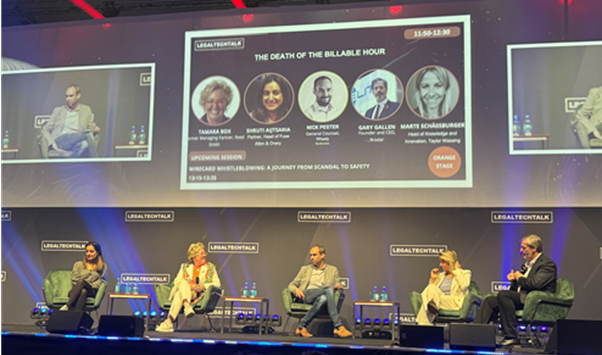I recently had the opportunity to attend LegalTechTalk 2024 in London – one of the largest legal tech events in Europe. I was particularly drawn to the panel session “The Death of the Billable Hour” and I could not help but notice a striking familiarity in the discussions—a sense of déjà vu. It has been over two decades since I first started exploring the intricacies of legal billing, and yet, the core issues and debates around the billable hour seem as pertinent today as they were twenty years ago. The panel discussion at the conference provided a deep dive into the ongoing evolution of legal billing practices, highlighting how the legal industry continues grappling with traditional billing models while navigating new client expectations and technological advancements.
The panellists and their perspectives
The discussion featured an impressive lineup of legal professionals, each bringing their unique experiences and insights into the evolving landscape of legal billing:
- Shruti Aijtsaria a partner at Fuse A&O Sherman, discussed how their approach to billing is intensely client-driven. Depending on geographical location and sector, they toggle between traditional billable hours and more client-preferred billing methods.
- Tamara Box, Partner at Reed Smith, emphasized that despite the introduction of legal tech, her firm remains predominantly driven by billable hours, especially for larger clients who depend on this model for budgeting and financial analysis.
- Marte Schassburger, leading Taylor Wessing Germany's knowledge and innovation department, echoed a similar sentiment. While still anchored to billable hours, there is an openness to adapting billing practices to better meet market demands.
- Gary Gallop, CEO of Rradar, discussed his firm's innovative approach, combining subscription models, fixed pricing, and success fees with traditional billable hours to provide a more flexible billing structure.
Key Themes from the Discussion
- Client-Centric Billing Models: One of the predominant themes was the shift towards billing models that align more closely with client expectations. This shift is not merely about changing how services are billed but fundamentally about understanding and delivering value as perceived by the client.
- Resistance and Adaptation: Despite the clear demand for change, there's significant inertia within law firms. The traditional billable hour model is deeply ingrained in the structure and culture of many firms, making systemic changes challenging. And further, it is also ingrained in many workflow technology, budgeting and accounting systems.
- The Role of Technology: Technological advancements have introduced efficiencies that challenge the justification for time-based billing. Legal tech not only streamlines processes but also offers the potential to shift the focus from hours worked to value delivered.
- Cultural Shifts within Law Firms: The transition away from billable hours requires a cultural shift within firms, demanding a change in mindset from the highest levels of management down to newly qualified lawyers.
Reflecting on the panel, it is evident that while the conversation around legal billing is evolving, the pace of change remains slow. The legal industry's cautious approach to innovation and change management continues to act as a barrier to adopting new billing models that could potentially enhance client satisfaction and firm efficiency.
Attending the LegalTechTalk 2024 was both enlightening and somewhat disheartening. It highlighted that while we have made strides in certain areas, the fundamental discussions around value, efficiency, and client satisfaction in legal billing have remained remarkably consistent over the years. It underscores the need for continued advocacy and action towards more transparent, fair, and client-focused billing practices in the legal industry.
To find out more or book a demo of the platform, visit:
www.allyone.com.au
Joanne Rees is the Founder and CEO of Allygroup and AllyOne. AllyOne is a legal spend management platform that combines proven, value-based methodology with LegalTech and AI to ensure legal spend is controlled and aligned with client outcomes.